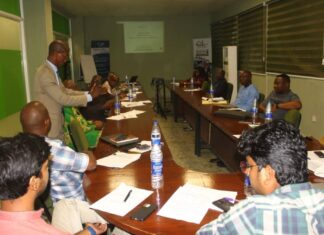Public Affairs Analyst, Nnamdi Nwigwe is emphatic that our leaders must have the required intellectual and managerial preparation…
This our beloved nation has had her fair share of political leaders who have remained largely anonymous, except when they are holding political offices. Check the records of many at council, state and national levels, past and present; many of them have no distinguished past. No pedigree. They appear on the political horizon like sputniks and when out of office, they evaporate.
Nigeria in the 21st Century can now do away with such charlatans. If we continue to recycle such men and women, we shall remain where we are at the moment – at the lower Prairies, both in our human, technological and economic indices.
How do we identify politicians who should no longer continue to operate in our national and local environment? Simple! Watch their body language as well as their utterances. A political office aspirant, who dwells on mundane and pedestrian issues in his soap-box and media appearances, is bereft of the type of cerebral equipment that modern politics demands. Such banal topics as zoning or rotation of elective political offices belong to yesterday. Even municipal subjects like provision of potable water and all-season roads in the community should not be raised by an aspirant to the post of governor or president in today’s Nigeria. After 54 years of political independence, such infrastructure should be available everywhere in the country. The type of politician we need now is one who has a solid background and a visible means of livelihood. In other words, we need professionals who come into political engagement from known and accessible addresses.
Have you wondered why many former political office-holders are scarcely heard of until the approach of another season of elections? If we had men and women who are truly qualified in the areas they claim to have certificates, diplomas and degrees, one would expect them to emerge from their offices, factories, chambers, classrooms, clinics, consultancies or even farms to vie for political offices if they feel like serving their people in practical, partisan politics.
Sincere and truly motivated professionals, who desire to temporarily operate at the political level, would quickly retreat to their natural habitats after serving or failing in the venture. People who know that their businesses would rather suffer than boom when they abandon them for political service to the nation or state are most unlikely to engage in the old habits of bribing or enticing the electorate with bags of rice and salt. They would offer themselves for services and, if rejected, return to where they came from. But those who cannot exist anymore without government pollute the political space and remain an incubus in the system.
We need educated, professional and visionary young men and women who have palpable pedigrees and global reach. A few older names known for their progressive ideas and provable honesty should also be embraced to add value of experience to the mix. Nigerians know such individuals and their incorruptible disposition. We want politicians who should be thinking and dreaming of the state of their nation in the next 10, 25 and 50 years from now and how to produce the human motor to drive the nation to that destination. Such leaders must be conversant with both national and international economy, diplomacy and, of course, politics.
In the age of Information and Communication Technology (ICT), our leaders should freely and openly compare notes with their peers across the world. They would have attended post-tertiary institutions like professional finishing schools, seminars and workshops and met with men and women of the same class who can watch their performances in office and supply them ideas. Our media should also rise in status and quality to the level at which we expect political leaders to operate.
Reporters should learn to ask questions that rattle the politician. There is nothing unethical in asking the man who wants to be your state governor or president of your country his age, his educational background, his old school mates, and his regular means of livelihood. If it is “free education” an aspirant is promising when he or she becomes a governor, they should be asked to explain what free education really means from their own perspective. Is it tuition-free award, or full scholarship comprising all one needs at school? Has any empirical research been commissioned to determine the population of the citizens at school at various levels? If they promise employment, what do they really mean by that? Is it the engagement of educated citizens in their subject areas or the provision of tricycles for urban taxi business by first and second degree holders?
In general, how does an aspirant intend to develop the human, mineral, marine, and arboreal resources of his state? What studies has he carried out on each subject before he aspires to serve as a governor? Not to ignore what the rustics want to hear, does he or she believe in zoning of a high elective political office like president or governor? If yes, why? If no, why not? A ready aspirant will give a good account of himself or herself if fired with such questions that need good brain to answer.
Finally, a political office aspirant who hides from media exposure is a suspect. He must have something he dearly wants to hide – shallowness of ideas and emptiness. Then why does he or she want to rule as governor or president where he would decide the fate of millions of Nigerians? Surely, we require a paradigm shift from today to ensure we can economically take off in the next one or two decades. Malaysia did it. Nigeria can also do it.













